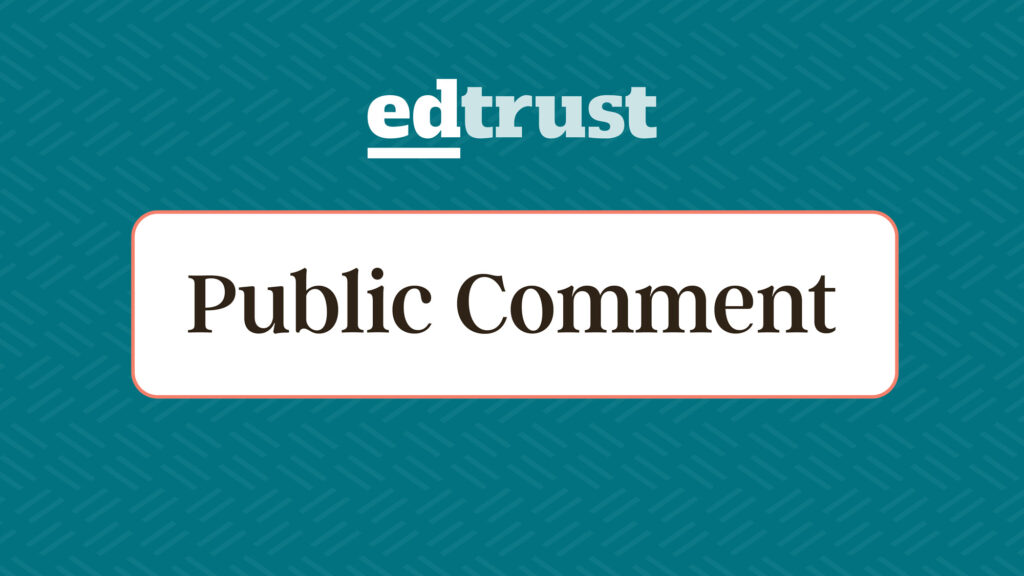Joint Comment to U.S. Department of Education on Their Proposed Changes to 2025-26 and 2027-28 Civil Rights Data Collection (CRDC)
35 organizations share feedback with the Department of Education on CRDC data collection

September 8, 2025
Ross Santy
Chief Data Officer, Office of Planning, Evaluation and Policy Development
U.S. Department of Education
400 Maryland Ave. SW
LBJ, Room 4C210
Washington, DC 20202–1200
RE: Mandatory Civil Rights Data Collection (Docket No. ED-2024-SCC-0128)
Dear Mr. Santy:
The undersigned organizations welcome the opportunity to respond to the U.S. Department of Education’s (ED’s) request for comments regarding the Department’s proposed information collection for the mandatory Civil Rights Data Collection (CRDC) for school years 2025-26 and 2027-28.
We appreciate the Department’s continued commitment to improving data transparency regarding the educational experiences of students in the nation’s nearly 100,000 public schools. The CRDC provides much-needed data and transparency for assessing educational quality, identifying concerning trends in resource allocation, and empowering families and advocates to push for policies that ensure all students, including students of color and students with disabilities, have access to high-quality education. The CRDC is a vital tool to understand how schools are serving all students and the value of this data collection for families, advocates, educators, and policymakers continues to grow.
Critically, the CRDC is a tool for stakeholders to monitor compliance with civil rights laws and collect information in support of potential investigations. The federal government has a legal responsibility to protect the rights of students in schools and ensure that students are not discriminated against per the Civil Rights Act of 1964, the Education Amendments of 1972, the Rehabilitation Act of 1973, and the Americans with Disabilities Act of 1990. The CRDC is necessary to ensure that schools are meeting students’ needs pursuant to these laws. In addition, the CRDC collects crucial information that states and districts include in parent-facing report cards according to the Elementary and Secondary Education Act, as amended by the Every Student Succeeds Act.
While the decision in Tennessee, et al., v. Cardona eliminates education protections for students based on their gender identity, we cannot ignore that transgender, nonbinary, intersex, and gender-expansive students’ rights are under attack by this administration. The CRDC should be a tool to help understand and collect data on emerging civil rights issues, such as the fair treatment of children based on a more expansive understanding of gender and gender identity. For example, because of the 2021-22 CRDC, we know that at least 11% of school districts across 40 states reported enrolling at least one nonbinary student. Collecting and reporting such data is a beginning step to developing the knowledge needed to understand how to meet the needs of gender-expansive students, who are one of the most vulnerable groups of students right now. We condemn the Department’s decision to remove gender identity from relevant definitions (e.g., harassment and bullying on the basis of sex) and to remove the nonbinary category from the CRDC.
However, to be most useful, the CRDC data must be revised, approved, collected and reported in a timely way. School districts need ample time to ensure their data systems are equipped to handle reporting requirements — well in advance of the relevant school year. Since the 2025-26 school year is underway in many places, we urge the Department and the Office of Management and Budget to proceed expeditiously with finalizing the CRDC for the 2025-26 and 2027-28 school years as proposed in this 30-day notice.
Thank you for the opportunity to provide feedback on the next rounds of the CRDC.
Sincerely,
AACTE: American Association of Colleges for Teacher Education
Advance Illinois
All4Ed
Alliance for Children’s Rights
Alliance to Reclaim Our Schools
American Association of People with Disabilities
American Association of University Women (AAUW)
Applied Learning Insights, LLC
Asian Americans Advancing Justice – AAJC
Brown’s Promise
Clearinghouse on Women’s Issues
Diverse Charter Schools Coalition
EdTrust
Education Law Center
Education Reform Now
Educators for Excellence
Families in Schools
Feminist Majority Foundation
Fund Our Schools Coalition of Virginia
InnovateEDU
Japanese American Citizens League
Kids First Chicago
League of United Latin American Citizens (LULAC)
National Charter Collaborative
National Education Association
National Parents Union
National Urban League
Neighborhood Legal Services of Los Angeles County
Sansing Helton Education Consulting
Service Employees International Union (SEIU)
The Legal Aid Justice Center
The Trevor Project
UnidosUS
Women Employed
Youth Justice Education Clinic at Loyola Law School